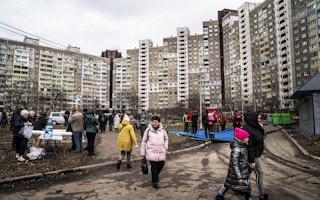Q&A: Standing Up for Ukraine

Russia’s military invasion of Ukraine is an assault on democracy and a violation of international law. It has also posed a grave threat to civil society in the country—including the staff, partners, and grantees of the International Renaissance Foundation, a part of the Open Society Foundations, which has been working in the country since 1990. Viorel Ursu, division director with Open Society’s Europe and Eurasia program, shared reflections on Russia’s history of aggressions in the region, the foundations’ legacy in Ukraine and what civil society can do going forward to help minimize harms.
You have been working on issues in Ukraine and the surrounding region for a long time. Tell us about your history with the country and how the news of the Russian assault is affecting you.
It’s emotional. I’ve been working with Open Society for 20 years on Ukraine and the region. We’ve been through many similar moments, unfortunately. History repeats itself.
I’m originally from Moldova. I remember a night similar to what happened Thursday. It was June 22, 1992, my graduation day. I was 17. It should have been one of the happiest nights of my life. I received my diploma and was looking forward to the party afterward. Just when we were heading there, we heard the sirens and the announcement: everything is closing down. Russian tanks were approaching the town.
I thought of that feeling Thursday morning, as the people of Ukraine woke up to the sound of bombing so close to Kyiv. What happened was in many ways not a surprise to me. But it did come as a surprise to many in Kyiv, Kharkiv, Mariupol, Odessa. They just didn’t want to believe it was happening.
The International Renaissance Foundation is a part of Open Society—close colleagues and partners in the work. How are they holding up at this dangerous hour?
Their safety and security are our biggest priority right now. Our biggest concern overall is to find ways to decrease the human suffering in the coming days, and to help people in need find their way to safer ground.
That means Europe needs to show solidarity—to keep borders open to those seeking safety. I hope Europe has learned lessons from previous conflicts and is more welcoming to refugees.
Ukraine has been an important focus of Open Society’s philanthropic work as the nation transitioned from Soviet rule to a developing democracy. What would you say are some of the more important contributions?
We have been working in Ukraine for more than 30 years. We were one of the first foundations there following the end of the Soviet Union. Our founder, George Soros, has a special place in his heart for Ukraine, and has devoted a lot of time, emotion, and resources to the country.
The International Renaissance Foundation exemplifies Open Society’s unique approach. We are guided by the needs of local people. And those needs have changed over the years. In the early 1990s, the focus was on developing critical thinking. People were coming from a system built on a single ideology. Many were confused about what to make of a post-Communist world. So we made education a priority, from kindergarten on up to higher education, to scholarships allowing study abroad to bring fresh perspectives. Libraries were a big focus, and publishing textbooks.
Over the years, priorities shifted. Public health programs became an important part of our efforts. Supporting the most marginalized. Doing HIV prevention work, palliative care. Ensuring access to medical and public services. And in the past 10 years, since the will of the people to sustain democracy was expressed in protests in the Maidan, we focused more on making sure the people’s ability to participate in public affairs was secured and sustained. That Ukraine held free and fair elections. That government was accountable to the people. That civil society’s ability to expose and root out corruption was strengthened.
How is the Russian assault affecting civil society’s ability to function? What role can they play when the situation is so dangerous and swiftly changing?
Ukraine has a strong and vibrant civil society—more so than other countries in the region. In the coming days, we expect to see a lot of internal displacement of people. We look to civil society groups to organize and mobilize to help, as they have in the past. We could see images soon of people queuing at the western border. Civil society in neighboring countries too will need to mobilize to help keep borders open, and welcome those fleeing danger for safety.
There also needs to be a focus on minimizing suffering and harm. And on making sure that the atrocities happening now are well-documented. The world needs to know what is taking place. There is the military war, and the information war. Civil society and the media play a big role in telling the real story, and calling Russia by its name, as the aggressor.
We also need civil society to help foster solidarity. We are seeing a strong Western response, but we really want to see a global response. Ukraine may be the victim, but the entire world is affected by Russia’s attack. A permanent member of the UN Security Council is denying the fundamental rules of global security. That’s not just Ukraine’s problem. It’s everybody’s problem.
More from Open Society on Ukraine:
